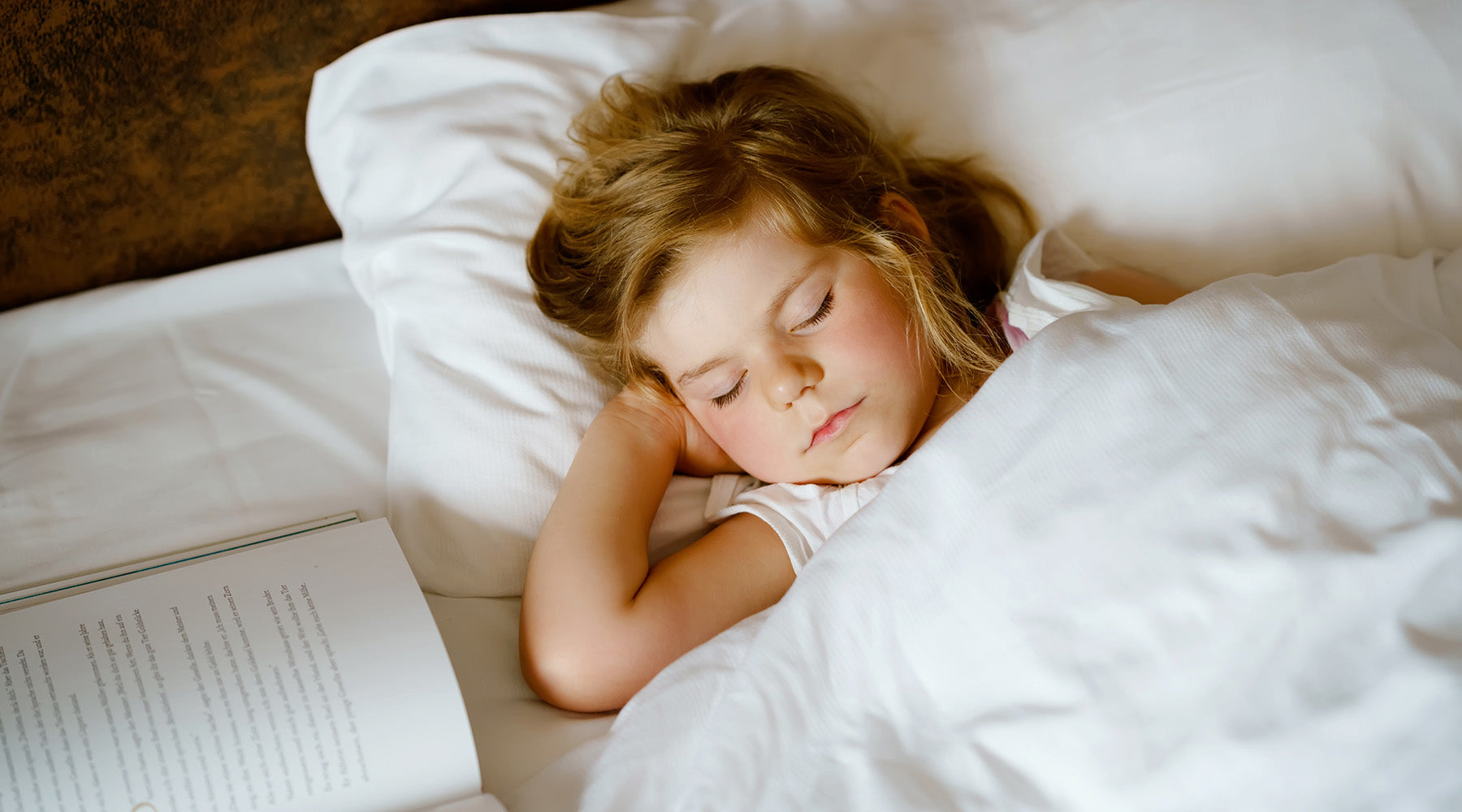
Tips for healthy sleep in children
Healthy sleep is crucial for children's development. It not only promotes growth but also mental and physical health. Unfortunately, many children today struggle with sleep problems. In this article, you'll find valuable tips for healthy sleep in children that will help promote a restful night's sleep for your little ones.
Table of contents
- Sleep in childhood
- The optimal sleep duration for children
- Tips for healthy sleep in children
- Conclusion
1. Sleep in childhood
Sleep is one of the most important activities for the well-being and development of children. During sleep, the body regenerates, immune system The brain strengthens and processes impressions. Sleep is especially crucial for growth and development in childhood, as the brain and body are still highly malleable during this time.
Babies and toddlers need far more sleep than adults because they undergo rapid physical and mental development during this period. Sleep therefore serves not only a restorative function, but also a regenerative and growth-promoting function. How much sleep You will now learn what children of different ages really need, what distinguishes a child's sleep needs from those of an adult, and how children's sleep can be effectively supported.
2. The optimal sleep duration for children
Babies Toddlers and infants require significantly more sleep than teenagers or young adults, as their physical and mental development is particularly intense during this time. During sleep, important regeneration and repair processes are initiated. Growth hormones are released, the immune system is strengthened, and impressions and new information are processed and stored.
Newborns sleep up to 17 hours a day. Since they don't yet have a fixed day-night rhythm, these hours are distributed throughout the day and night in 5 to 6 sleep phases. A large part of this sleep is REM sleep, also called "Dream sleep“, which is particularly important for brain development.

During the first months and years of life, the Sleep rhythm to gradually adapt to the natural day-night cycle. The nighttime sleep duration increases and the need for sleep gradually decreases. Toddlers up to 2 years of age ideally need 11 to 14 hours of sleep, while children aged 2 to 5 years usually need up to 13 hours of sleep at night. From school age (6-13 years), the ideal sleep requirement is between 9 and 11 hours per night. During this time, a fixed rhythm is established, with daytime sleep (nap) is gradually eliminated.
| Old | Ideal sleep duration | Sleeping habits |
| 0-3 months | 14-17 hours | Naps spread throughout the day, sleep intervals of approx.3-4 hours |
| 4-11 months | 12-15 hours | 2-3 naps per day, longer night sleep phase |
| 1-2 years | 11-14 hours | 1-2 naps, long sleep phase in the evening |
| 3-5 years | 10-13 hours | No more naps, but early sleep |
| 6-13 years | 9-11 hours | Constant sleep rhythm, little to no naps |
| 14-17 years | 8-10 hours | Longer night's sleep, but often later bedtime |
| >18 years | 7-9 hours | Continuous sleep in one night |
Younger children (newborns and infants) sleep more frequently in multiple intervals during the day, while older children and adolescents need a longer, uninterrupted sleep period at night. It's important that children get into a sleep routine as early as possible and lie down regularly, even on weekends.
The quality of sleep is just as crucial as its duration. Sufficiently deep sleep phases ensure a restful night and support growth and regeneration.
3. Tips for healthy sleep in children
The right sleeping environment, a stable daily rhythm, and relaxing evening rituals are crucial for children's sleep quality. Here are some valuable tips to promote healthy sleep and Sleep disorders to counteract:
Tip #1: Regular bedtimes and daily structures
Children benefit enormously from a regular sleep schedule. A consistent Daily routine Provides security to the body and helps stabilize the body's internal clock. When children go to bed at regular times, it's easier for them to get tired at the right time. Especially in the early years, regular bedtimes are crucial for the development of circadian rhythms (the natural internal clock).
A structured day ensures that children know when it's time to get up, eat lunch, and sleep. This daily routine promotes a sense of security and helps them fall asleep. Flexibility is important, of course, but a stable rhythm helps prevent sleep problems.
Tip #2: Calm sleep routines and evening rituals
The introduction of evening rituals can make the transition from an active day to sleep smooth. A fixed ritual – for example, a warm bath, a bedtime story, or listening to calming music – signals to the body that it is time to Relax and falling asleep.

Exciting or strenuous activities should be avoided in the last 30 to 60 minutes before bedtime. A quiet, relaxed atmosphere before bed helps calm the nervous system and facilitate falling asleep. Routines create a positive association with sleep and promote a deep night's rest.
Tip #3: Lots of exercise and activity during the day
Movement is essential for children's physical and mental health. Children who are active and play enough during the day generally sleep better. Physical activity helps burn off excess energy and relax the body, making it easier to fall asleep. Exercise, walks, or simply playing around can help increase the need for sleep.
However, it's important that children avoid intense physical activity too late in the day, as this can disrupt relaxation and sleep. Physical activity should ideally take place in the early afternoon or early evening, not immediately before bedtime.
Tip #4: A comfortable sleeping environment
The sleeping environment is a crucial factor for sleep. Make sure the nursery is quiet, dark, and not too warm. A comfortable room temperature for sleeping is around 16-18°C. Darkness promotes the production of the sleep hormone. Melatonin, which is important for the natural sleep-wake rhythm. If the child is still very young, blackout curtains or blinds can help keep the room dark. A soft, dimmed night light or certain Fragrances can also contribute to a child-friendly, comfortable sleeping atmosphere and prepare for a relaxed sleep.
Noises such as street noise can Fall asleep A quiet room without distractions is ideal for a restful night. If necessary, white noises or quiet Music help mask disturbing ambient noise.
Tip #5: The right sleeping equipment
A comfortable mattress, a matching pillow and a comfortable Duvet are crucial for restful sleep and a comfortable sleeping environment. Especially during active developmental phases or growth spurts, it is important to pay attention to the right sleeping equipment to promote healthy posture during sleep. This helps prevent poor spinal posture and Pains or to avoid tension in the morning.

Ergonomic pillows for adults are often too firm and too high, which is unsuitable for children. Due to different physical constitutions, such pillows can prevent a comfortable sleeping position. Children's body dimensions and shoulder width are narrower than those of adults, and the pressure on their bodies is lower. Therefore, specially designed children's mattresses and pillows are a better choice. They are tailored to the needs of children: They provide appropriate support. Height, less firmness and adapt better to the body contours of the little ones.
Find out how to find the ideal pillow for your child in our Children's pillow guide.
A well-chosen sleeping equipment that is tailored to the child's anatomy supports a healthy posture of the spine and head and helps children sleep comfortably and peacefully.
Tip #6: Nutrition and sleep
Nutrition also has an impact on sleep. Heavy, fatty meals or sugary Snacks should be avoided shortly before going to bed, as they stimulate the body unnecessarily. caffeinated Drinks like cola or chocolate can disrupt sleep.
A light snack before bedtime, such as a banana, which contains a lot magnesium or a small glass of warm milk can have a calming effect and promote sleep. Milk contains tryptophan, an amino acid that increases serotonin levels in the brain and thus supports the sleep process. You can find more sleep-promoting nutritional tips here. here.
Tip #7: Reduce screen time
Constantly being exposed to screens – be it TV, tablet or
Encourage your child to engage in quieter activities like reading or drawing during this time. These activities help gently end the day and prepare the body for sleep.
4. Conclusion
Healthy sleep is crucial for children's physical and mental development. With the right habits and a comfortable sleeping environment, children's sleep quality can be significantly improved.
- Sleep is essential for children's growth and mental development. Maintain regular sleep times to stabilize their internal rhythm.
- Sleep needs vary depending on age, but all children benefit from stable, adequate sleep.
- Regular bedtimes, exercise, calming evening rituals and a pleasant sleeping environment promote healthy sleep.
- Special children's pillows and mattresses ensure a healthy sleeping posture and prevent poor posture and tension in the cervical spine.
- Make sure you eat a balanced diet and avoid stimulating foods shortly before going to bed.
- Reduce screen time in the evening to support melatonin production and make it easier to fall asleep.
With these tips, you can create the best conditions for your child to have a healthy and restful sleep.


Leave a comment
This site is protected by hCaptcha and the hCaptcha Privacy Policy and Terms of Service apply.